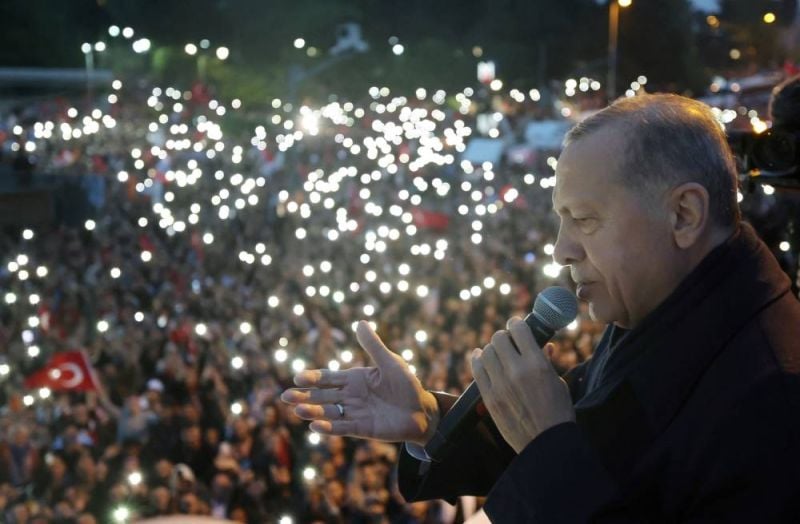
This handout photograph taken and released by the Turkish Presidency Press Office on May 28, 2023 shows Turkish President Recep Tayyip Erdogan addressing supporters gathered outside his residence following his victory in the Turkish presidential election at Kisikli district in Istanbul. (Credit: Murat Cetin Muhurdar/Turkish Presidential Press Service/AFP)
The elections in Turkey have been attracting much international attention and commentary. The Financial Times called the presidential vote “a defining election” for Turkey. The Economist went further to state that the “opposition could sense success against Erdogan.’’ In an editorial in The Washington Post on May 8, 2023, Asli Aydintasbas, a visiting fellow at the Brookings Institution, was making policy recommendations for the post-Erdogan era. Much of the prognosis for the success of the opposition lay in the state of the Turkish economy, which was witnessing its highest inflation rates since the late 1990s, as well as the massive damage caused by the earthquakes in Hatay province and 10 other provinces in Turkey’s southeastern region.
On May 14, the voter turnout rate of close to 87 percent was among the highest in recent decades. In the parliamentary elections, the coalition of parties known as the People's Alliance (or Cumhur Ittifaki) and spearheaded by the Justice and Development Part (AKP) and consisting of the Nationalist Movement Party (MHP) and other conservative parties secured 323 parliamentary seats out of 600. The six-party Nation Alliance (or Millet Ittifaki), comprising the center-left Republican People's Party (CHP) and including the IYI Party, a center-right and nationalist group, as well as parties catering to a smaller voting base, obtained 212 seats. In the face of legal proceedings that could see the Peoples’ Democracy Movement (HDP) disbanded as a political party, a newly constituted party, the Green Left Party, entered the elections and won 61 seats in the Turkish Parliament. Thus, the ruling coalition of parties represented by the People’s Alliance maintained its majority in the Turkish Parliament. In the presidential race, the incumbent President Recep Tayyip Erdogan secured 49.52 percent of the popular vote, while opposition leader Kemal Kilicdaroglu secured 44.88 percent. In the second-round vote that took place on May 28, Erdogan won, obtaining around 52.16 percent compared to 47.84 percent for his opponent, Kemal Kilicdaroglu. From a purely electoral viewpoint, some have argued that a lower turnout rate in cities where the opposition held power as well as among pro-Kurdish voters may have affected the second-round results.
From a more substantive viewpoint, we could ask why the international commentary failed to correctly anticipate the outcome of these elections. One reason given is that by not fielding a candidate of its own and by supporting the candidacy of Kemal Kilicdaroglu, the actions of the pro-Kurdish party HDP may have helped Erdogan to play the nationalist card. Another explanation for the result is that the opposition may have overplayed its hand in terms of the economic hardships currently facing the electorate. In this respect, despite the inflationary environment, the Turkish economy is not facing a recession and even grew by over 5 percent in 2022. Media control has been cited as another reason for Erdogan and his party’s continued grip on the Turkish polity. The government has also used many fiscal tools at its disposal to shore up its support. However, Erdogan’s continued popularity also rests on the fact that the groups benefiting most from Erdogan’s rule in the past 20 years are the lower-income populations and hitherto disenfranchised groups. While Turkey’s GDP per capita, measured in purchasing power parity terms (in constant 2017 international dollars) has increased from $14,839 to $31,467 between 2002 and 2023, many social assistance programs were also put in place during Erdogan’s 20-year rule. Even Turkey’s infrastructure building program over the last 20 years has benefited many small cities and hard-to-reach areas in Anatolia that boast a conservative voter base.
How will the dynamics of policy choices and political alignments in Turkey evolve in the coming days? Will Turkey continue to follow the unconventional monetary policy that it has been pursuing in recent years? According to these policies, lower interest rates are supposed to reduce inflation and increase exports by boosting the competitiveness of small firms, thereby helping to cure Turkey’s perennial current account deficit problem. However, it has been well documented that the episode of a major decline in the Central Bank of Turkey’s policy rate by December 2021 led to an increase in turbulence in Turkey’s financial markets and a jump in the cost of insuring its sovereign debt. The decline in interest rates also came at the expense of a large increase in Turkey’s cost of living and a deterioration in the balance sheets of firms that borrow in foreign currency. There are reports of discussions within Erdogan’s party between groups that favor a new policy of gradual interest rate hikes and targeted lending versus those that favor sticking with the current program of interest rate cuts. What lessons will the opposition draw from its performance in the elections of 2023? Will it conclude that garnering nearly 50 percent of the popular vote was a rubber stamp of its platform or will it examine alternative approaches? All these are questions that will receive answers in the coming days.
Sumru Altug is a University fellow at the Issam Fares Institute for Public Policy and International Affairs of the American University of Beirut.